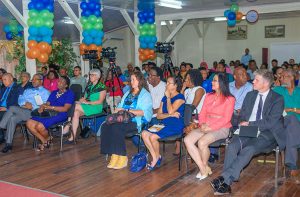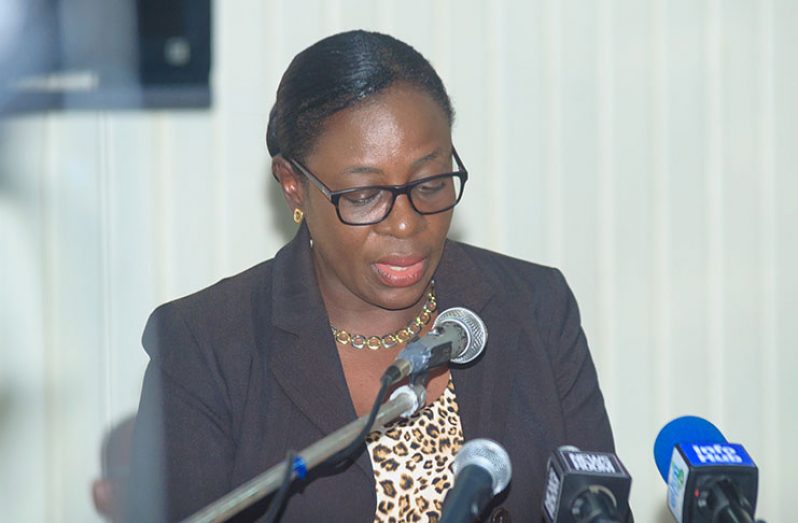–under new sector-improvement project
THE Ministry of Education will be moving to review a 20-year-old school curriculum, in an effort to re-energise the education sector here.
Particular focus will be placed on English and Mathematics, subject areas the education system has been struggling with over time.
Special focus will also be placed on the inclusion of the use of technology to aid teaching and learning, Minister of Education, Nicolette Henry has said.
The Minister was speaking on Wednesday to educators, students and other stakeholders during the launch of the Guyana Education Sector Improvement Project (GESIP) at the National Centre for Educational Resource Development (NCERD).
According to the Minister, it has already been acknowledged that the education system has to be fortified to serve all of Guyana’s students. It is for this reason, she explained, that the government has re-engineered a system that will produce a new framework, which will give every child the chance to be educated to their full potential.
“We have work to do, by closing the disparities in education among schools and regions, raising grades in English and Mathematics in particular across the education spectrum, especially in the hinterland areas, and making sure that every child has access to equal education,” Minister Henry said.
She added that the project is a team effort, in that “all hands are on deck” to produce the quality outcome needed from 2018 and beyond.
The project, she said, has been carefully designed, with specific measureable markers lending attainability to the results. It has four phases, beginning at the nursery and ending at the tertiary level.

Those components include training teachers and lecturers in course delivery and teaching practices. Educators are also expected to ensure that the students are part of the performance evaluation system, which she said has been tested and has shown qualitative results in the primary and the secondary schools.
The Ministry will also be acquiring technology for higher quality education to facilitate learning in classrooms in remote areas, the Minister related.
“The components are pillars of a new system of education that transform students. Teachers development and training is important,” she said.
Speaking also at the event was Chief Education Officer (CEO), Mr Marcel Hutson, who said that the dynamic nature of education requires constant review and research of programmes, with a view of the education system being relevant by meeting the social and economic needs of a society. He said the Ministry’s intention is to produce global citizens that will add value to the country and the world at large.
According to him, the success of the project requires a multiplicity of informed decisions to be taken; which is what the project is all about.
“Some of those decisions include the review of the curriculum, which is the core of any education system,” he said. It is therefore incumbent upon us to ensure that the curriculum is so structured,” he added.
He, too, pointed out that the education system has struggled with Mathematics and English, which is why more focus will be given to a more “hands-on approach to the teaching of these subjects”. He said there will also be a concentration on the use of technology on the teaching/learning process.
ENCERD Director, Ms Jennifer Cumberbatch, said the project brings everyone closer to a new and improved curriculum, which is considered the heart of any learning institution. An effective curriculum, she said, provides teachers and administrators with a measure of plan and structure of delivering quality education.
“A reviewed curriculum is long overdue. There are many new and emerging challenges and demands to education and on curriculum,” Cumberbatch noted. She said that seeing that the last curriculum review was done in the 1990s, it is high time for a renewal.
Cumberbatch said the revised curriculum will promote the development of competencies, including critical thinking, the use of technology, problem solving etc.
“With this spiral curriculum that we intend to have; we will see that our nursery, primary, secondary and tertiary levels indeed support each other,” she promised.



.jpg)








